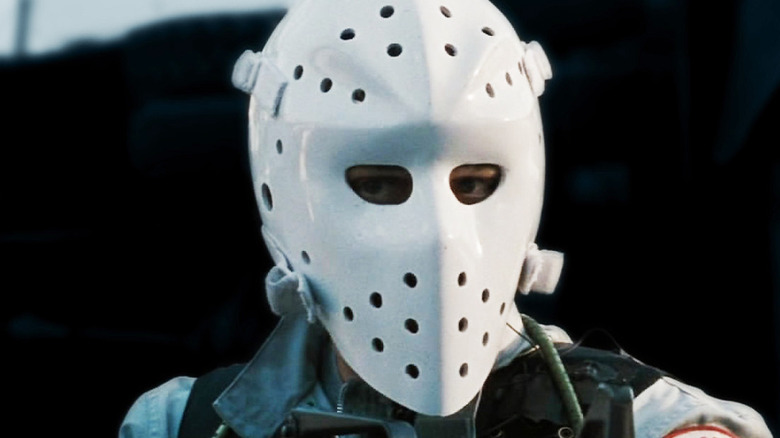
Heist movies transcend genre. You can have frivolous, fun heist movies like "The Italian Job," or heartfelt, straight-faced ones like "Point Break." The heist itself can be meticulously planned and meditative, like the one in "Inside Man," or fall apart before it's even begun, as in "Good Time."
To be clear, this is a list of heist films, not movies about con artists. "The Sting," "The Brothers Bloom," and "Gambit" are all brilliant, but the heist tropes -- planning the mission, gathering the team, and so on -- are missing. They feel more like a magic trick than an actual heist. Similarly, the heist needs to be the focus. "Dog Day Afternoon" and "The Usual Suspects" are excellent, but they're more about the characters and the twisty plot than the heist itself.
By contrast, in the following movies, the plot always ultimately revolves around the robbery, which is either something the film builds to, or a key turning point in the story. In any case, these are our picks for the 20 greatest heist films of all time.
Logan Lucky
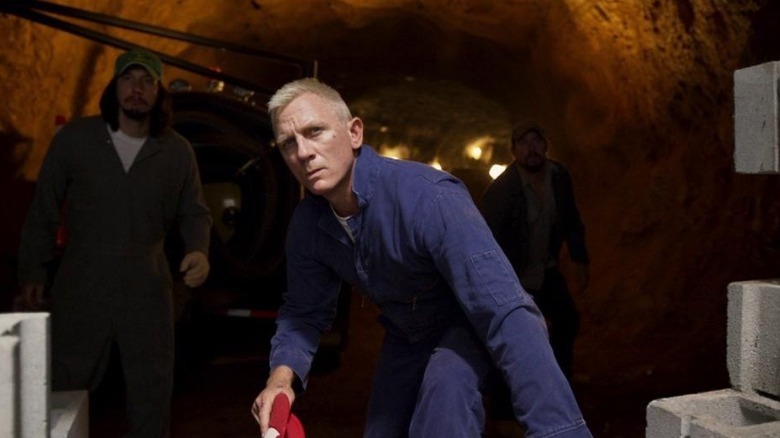
Soderbergh's rough and ready heist film (referred to as "Ocean's 7-11" in the film, making for a nice self-referential moment) is a lot of fun, serving as a neat subversion of the tropes Soderbergh used in his earlier movies. Channing Tatum and Adam Driver play an unlikely pair of brothers who plan to rob a NASCAR racetrack, while Daniel Craig is a revelation as a flamboyant explosives expert -- a role that almost certainly played a part in him getting cast in "Knives Out".
Soderbergh could so easily have turned "Logan Lucky" into a sneering parody of its southern characters, but instead plays things perfectly. All of the elements of small town life that lead everyone to underestimate Tatum and his gang help the plan rather than hinder it. The lack of cell phones, the corrupt prison system, and Tatum's simple nature mean that the FBI are unable to pin down the specifics of the burglary. "Logan Lucky" is a fun and surprisingly touching film -- even Seth McFarlane's irritating British accent can't ruin it.
Dead Presidents
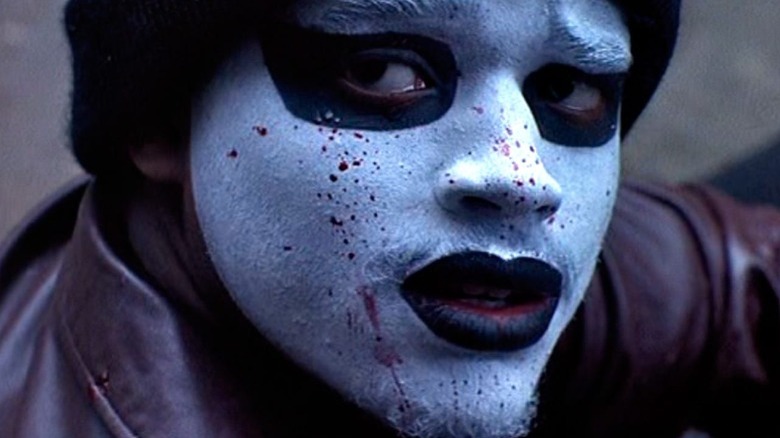
The Hughes brothers' second film instantly throws you in the deep end, showing us a group of thieves preparing to rob an armored truck, before flashing back to the events that led protagonist Anthony (Larenz Tate) down this path. "Dead Presidents" often feels like it's veering off into a very different direction, as Anthony falls in love and joins the army just as the Vietnam War breaks out. This could have made the heist seem like something of an afterthought, but instead it informs the characters, explaining their later actions without the need for a massive exposition dump.
Tapping into the poor treatment returning veterans faced after Vietnam and the difficulties they had rejoining society, the directors take their time establishing an assortment of colorful characters. Despite standouts like Keith David's one-legged bookkeeper and Freddie Rodriguez's pyromaniac, the most moving performance comes from, of all people, Chris Tucker, who plays an easygoing friend of Anthony's who turns to heroin after his wartime experience. "Dead Presidents" is just as angry and vital today as it was upon release; it doesn't make excuses for the protagonists, but Tate's final outburst still resonates as a damning indictment of how society treats veterans.
The Taking Of Pelham One Two Three
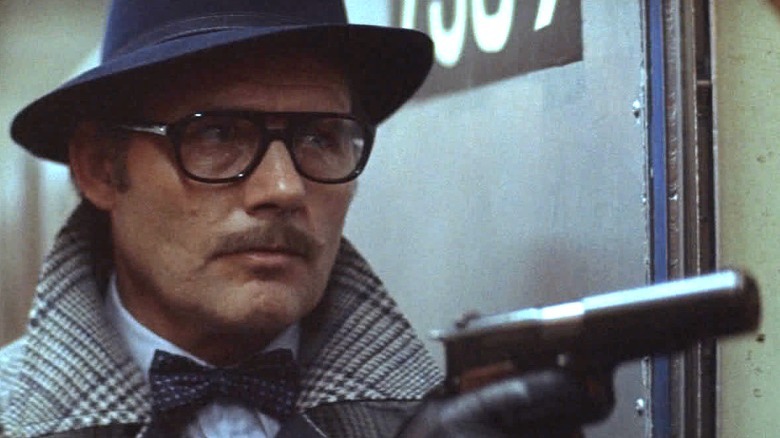
In this tough as nails 1974 thriller, Walter Matthau stars as a doggedly determined detective who negotiates with four gunmen who hijack a subway train (passengers and all) and demand one million dollars from the city for its release. Robert Shaw delivers a coldly clinical performance as an enigmatic, ruthless mastermind, while his gang (Martin Balsam, Hector Elizondo, and Earl Hindman) each make their characters distinct. Elizondo's psychotic loose cannon is especially memorable.
With the use of color-coded aliases, (Mr. Green, Mr. Brown, etc.) this is a definite precursor to "Reservoir Dogs," and Matthau's performance is a perfect blend of the tough guy persona that he perfected in films like "Charley Varrick" and the comedic roles he took later in life. Here, he plays Lieutenant Zack Garber with a heavy dose of irony as he negotiates with Shaw's implacable thief, and while "The Taking Of Pelham One Two Three" sometimes veers into comedy (especially Jerry Stiller's detective, as well as the final punchline) this only serves to make the sudden bursts of violence all the more shocking.
Ocean's Eleven
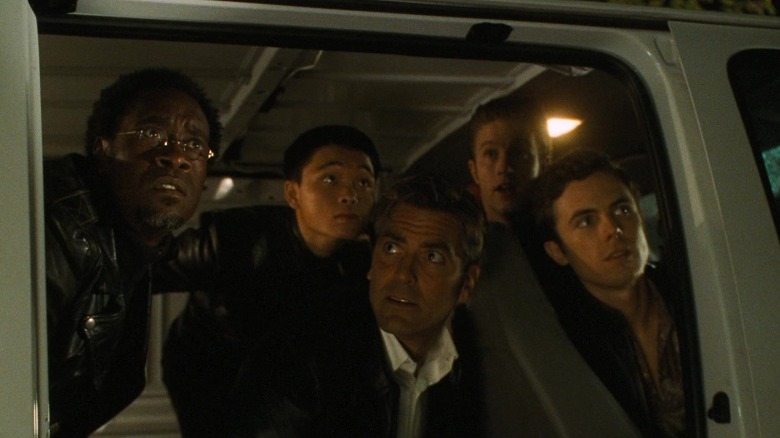
Too often dismissed as lightweight and therefore somehow not worthwhile, Steven Soderbergh's slick heist film heavily influenced the way that heist films are edited and shot. If there hadn't been an "Ocean's Eleven," there wouldn't be a "Now You See Me" or any of the other pretenders. One of Soderbergh's major talents has always been his fluid use of editing, and here his cuts make what could be a convoluted plot seem light, breezy, and incredibly cool.
There's a misconception that because a film is fun and mainstream, it shouldn't be taken seriously, but "Ocean's Eleven" succeeds precisely because of Soderbergh's precision behind the camera. It takes a lot of effort to make something seem so effortless. While its sequels would prove increasingly self indulgent and contrived, "Ocean's Eleven" manages to juggle its cast expertly, giving each of them their moment to shine -- no mean feat when you've got a cast of 11! Just as slick today as it was in 2000, "Ocean's Eleven" still stands up as one of the all-time coolest heist films.
Widows
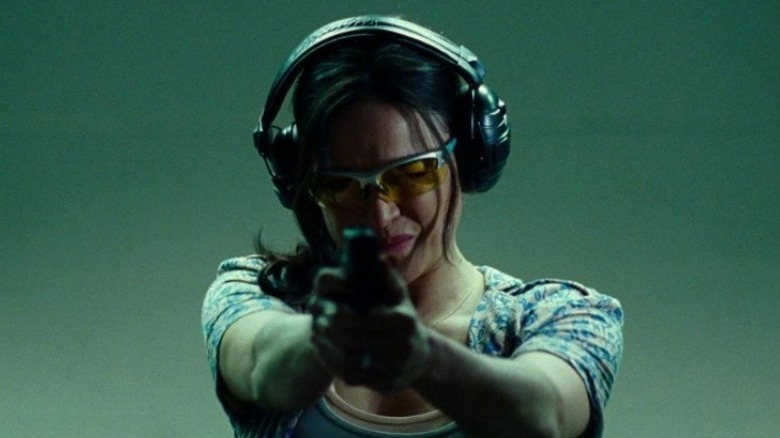
Steve McQueen's one attempt at a pure genre piece so far, this remake of the Lynda LaPlante series from the '80s is one of his most satisfying (and rewatchable) films. It is a timely and relevant slice of feminist cinema that doesn't rely on condescending "girl power" ("Ocean's Eight" this is not).
Viola Davis, Elizabeth Debicki, and Michelle Rodriguez play women who come together after their husbands are killed in a heist gone wrong. Completely out of their depth, they nevertheless resolve to carry out a robbery in order to repay the man their husbands stole from. Davis utterly owns the film as the de facto leader, while Cynthia Erivo proved she was one to watch as the babysitter-slash-driver.
The beauty of "Widows" lies in the meticulous way the women prepare for the robbery, casing the target's house and practicing with different weights of money. It's an excellent depiction of non-criminal characters planning a heist, and whether they're acquiring guns, buying a getaway vehicle, or doing some amateur sleuthing, the makeshift way each of the gang gets ready feels incredibly plausible. What goes unsaid is how the women are completely discounted as being a threat due to the simple fact of their sex (their one male ally is taken out of the picture very early on) and how they use this to their advantage, even pretending to be men during the actual heist.
Hell Or High Water
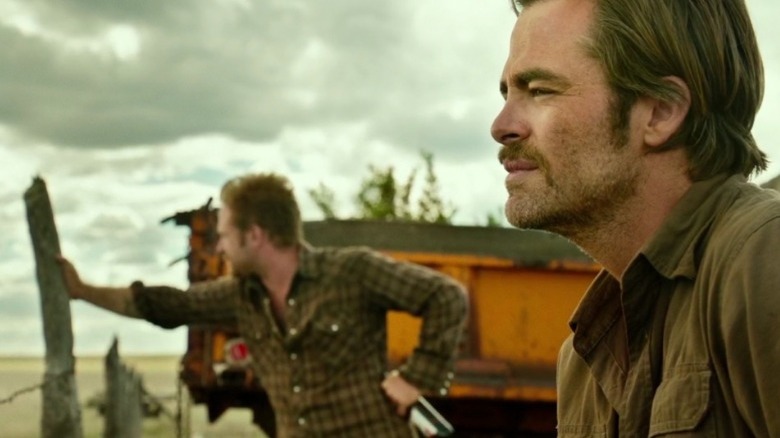
In a genre that largely deals in black and white, it's refreshing to come across a film in which all of the main characters are likeable and feel like real people. This modern day western adds an interesting little crinkle into the premise -- rather than one big robbery, brothers Toby and Tanner (Chris Pine and Ben Foster) commit a series of bank heists on the road, targeting the bank chain that harassed their mother and put her in an early grave. Pursued by an irascible sheriff played by Jeff Bridges and his Mexican partner (Jay Birmingham), the brothers move quickly from bank to bank, burying their getaway cars after each robbery, and laundering the money in Las Vegas to avoid detection.
Pine is almost unrecognizable, giving an understated, measured performance as the brains behind the operation that's very different from his usual cocky on-screen persona, but it's Foster who steals the film as his utterly fearless older brother. A lesser film might have made Tanner unhinged or psychotic, but "Hell or High Water" takes pains to show you how much the brothers care for one another. Despite Tanner's obvious issues, he has a heart and looks out for his younger brother. Often feeling like a heist film directed by the Coen brothers -- in the best way possible -- "Hell or High Water" is a meditative, wry take with a sting in its tail.
Inception
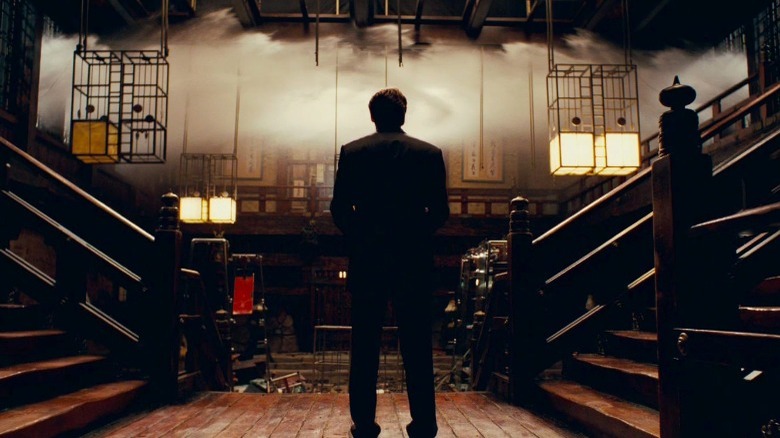
If it wasn't for the head-scratching science fiction elements, Christopher Nolan's enigmatic film would be a fairly standard heist movie. With them, it becomes one of the most enduring heist films of all time. All the tropes are here -- the genius mastermind, the recruiting of the crew, the meticulous planning -- but instead of stealing something, the gang are planting a thought in the dreams of a businessman played by Cillian Murphy.
Leonardo DiCaprio plays Cobb, the leader who designs dreams and acts as the guide to this convoluted premise; unlike some of his later films, Nolan lays out the rules of this world clearly and comprehensively, so that the audience is never lost. In fact, the only real complication is Marion Cotillard as Cobb's dead wife, who turns up as his subconscious throughout, throwing a spanner in the works. Each member of the crew is brilliantly sketched out, from Joseph Gordon Levitt's matter-of-fact fixer to Tom Hardy as the flamboyant forger. "Inception" is still Nolan's most purely entertaining film, with constantly changing scenery and plot twists that keep the audience guessing right up until the final, famously ambiguous shot.
The Killing
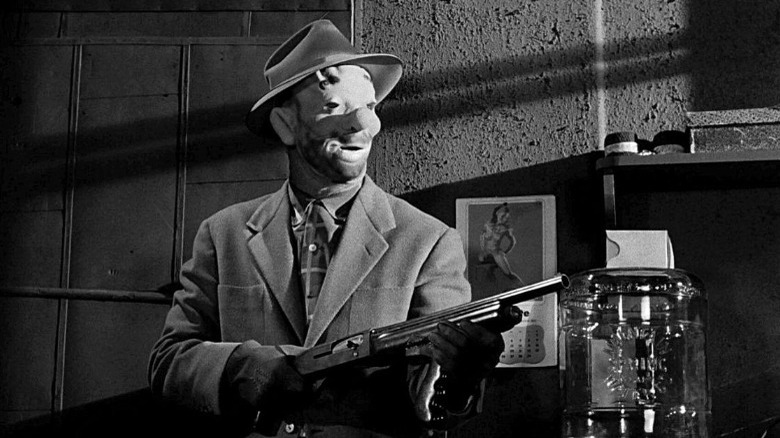
One of Kubrick's first films, "The Killing" is one of the formative heist films, laying the foundations for pretty much the whole genre. Sterling Hayden's smooth Johnny Clay recruits a desperate group of first-time criminals to assist in his plan to steal two million dollars from a racetrack. The beauty of this film lies in the way Kubrick parses out details of the heist bit by bit, along with the non-linear structure which shows different elements of the heist unravelling simultaneously while a droll narrator lays out the timing of the heist itself.
Of the unlikely group of robbers, the uniquely odd Timothy Carey comes close to stealing the show as the rat-faced sharpshooter, but the always great Elisha Cook Jr., who plays a henpecked cashier who constantly has to placate his calculating wife (Marie Windsor), ends up being the standout. Cook gets the most pathetically triumphant moment of the film, while Windsor is just about the most venal, avaricious character in a movie full of them. Kubrick's stylish cinematography and sense of irony make "The Killing" eminently watchable, and the final scene is one of the most unbearably tense in his filmography, as Clay's plan comes crashing down because of one tiny oversight.
Gonin
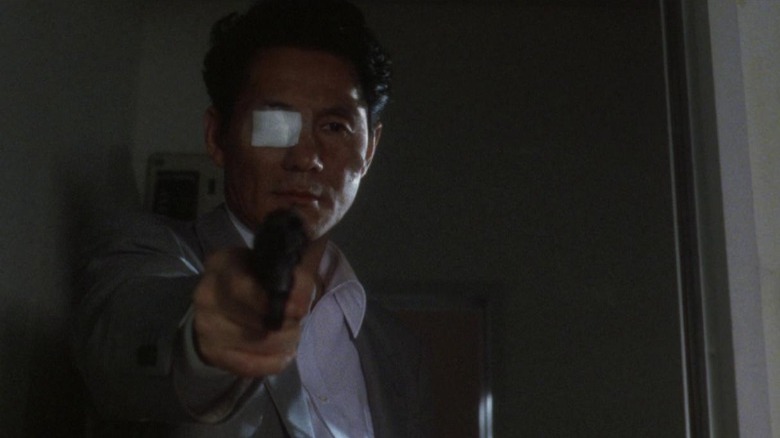
Another heist movie with a heavy dose of social commentary, "Gonin" (or "The Five") is an old-fashioned story of a mismatched group of misfits coming together to rip off the yakuza. Bandai (Koichi Sato) is a struggling disco owner and heavily in debt. When he encounters several other undesirables in similarly dire straits, he comes up with a plan to rob the gangsters and pay them back with their own loot. Unfortunately, the group he recruits are among the most erratic bunch of amateur thieves in Japan, and the robbery goes off the rails almost immediately.
As they are hunted down by two gay hitmen (one of whom is played by the legendary Takeshi Kitano), the secret lives of the gang are revealed, including one particularly disturbing revelation -- they are then picked off one by one until the survivors take the fight back to the yakuza. Stylish, brutal, and completely unforgiving, director Takashi Ishii paints a singularly fatalistic portrait of Japanese society, pulling the rug out from under his audience on numerous occasions. The gang themselves serve as a kind of microcosm of the cracks that were appearing in Japanese society in the '90s, consisting of a pimp, a corrupt cop, a desperate salaryman, and a gigolo. Even the hitmen are outcasts, looked down on by their bosses. "Gonin" is an original and vital piece of modern Japanese cinema, and criminally overlooked in the west.
Heat
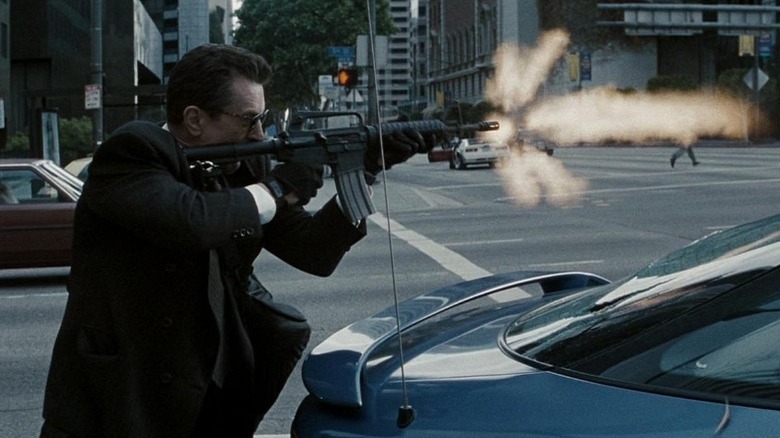
Michael Mann's seminal film is one of the most influential crime thrillers ever made, and its fingerprints evident on films as varied as "The Dark Knight" and "Infernal Affairs." Robert De Niro and Al Pacino, in their first appearance on screen together (if we ignore "The Godfather Part Two," in which they never shared the screen), give electric performances as the consummate professional thief and the formidable detective on his tail.
It's a simple story told on an epic scale, and Mann withholds judgment on his characters, letting the audience decide who to empathize with. Pacino's workaholic detective is on the right side of the law but ignores his wife, while De Niro's callous thief begins a sweet relationship with the girl he meets in a coffee shop. Pacino and De Niro play a game of cat and mouse that lasts the whole film, culminating in the central heist scene and subsequent shoot-out. The thieves (De Niro, Val Kilmer, and Tom Sizemore) move like a military unit, hotly pursued by Pacino and his team.
Mann used the actual gunshots recorded on set rather than sound effects to create more immersive scenes, and it works -- the showdown in the middle of the city is one of the most kinetic, exhilarating shootouts in film history. An elegiac, impossibly cool film, "Heat" has had an immeasurable impact on modern cinema.
Thunderbolt And Lightfoot
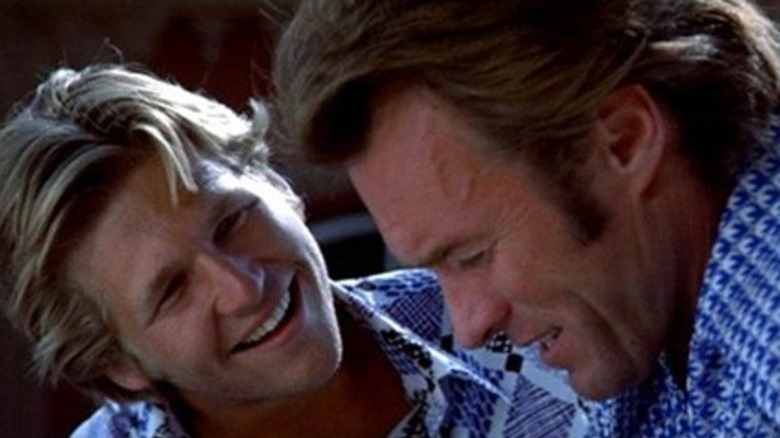
A poignant blend of road movie, buddy movie, and heist movie, Michael Cimino's debut follows Clint Eastwood as the legendary Thunderbolt, a bank robber who got put away for an infamous bank robbery and is now on the run from his former accomplices, the brutal Red (George Kennedy) and the dopey Goody (Geoffrey Lewis). He eventually runs into a drifter named Lightfoot (an impossibly young Jeff Bridges), and after the four reconcile, they plan on completing the heist they didn't finish years earlier.
What sets "Thunderbolt and Lightfoot" apart from other heist films is the combination of broad comedy and melancholy that infuses the film. The scenes showing the gang raising funds for the heist are genuinely funny (especially Goody getting a job as an ice cream man) but the ending is one of the saddest of the era. The whole gang is perfectly cast -- Eastwood is more human and natural than he'd ever been up to this point, Kennedy is unpredictable as the savagely violent antagonist, Lewis is incredibly sweet, and Bridges manages to make his cocky upstart genuinely endearing. Some of the dialogue is creaky and there's a very '70s misogynistic streak running through the movie, but the bond that forms between the two leads is genuinely touching.
Odds Against Tomorrow
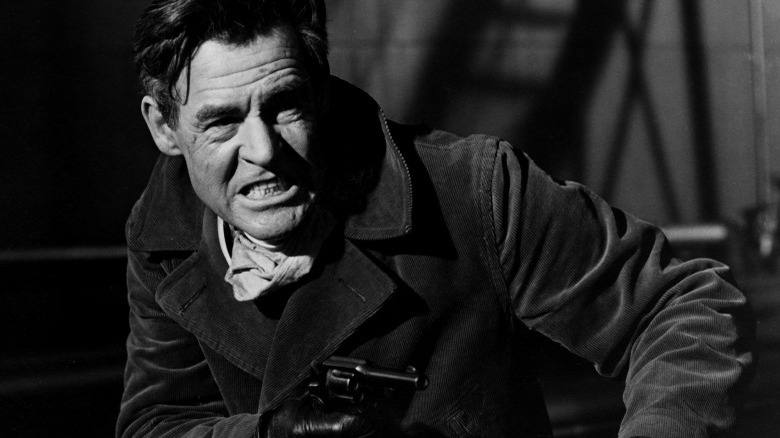
While "Touch Of Evil" is often held up as the final flourish of the classic film noir era, "Odds Against Tomorrow," released a year later, is noir through and through -- and an excellent heist movie to boot. Like "Dead Presidents" it spends the majority of its runtime familiarizing the audience with the main players: the smooth but struggling jazz musician Harry Belafonte, hugely in debt to a local gangster, and the bitter racist Robert Ryan, emasculated by his wife and desperately trying to regain some form of independence. They loathe each other on sight, and Ed Begley's genial ringleader has his hands full trying to keep them from killing each other before the robbery even begins.
The plan itself is beautifully simple but ultimately undone by dumb luck. It's almost over before it even begins, with the hostilities between Belafonte and Ryan boiling over right from the start. Everyone is firing on all cylinders here, giving muscular, raw performances, but Ryan in particular is just incredible, managing to elicit pity, if not outright sympathy. As loathsome as he gets, you get the impression that he hates himself even more than everyone else does. The ending rivals "White Heat" in its incendiary nature, ensuring the film noir age went out with a bang. That final line is a hell of a punchline, too.
The Hot Rock
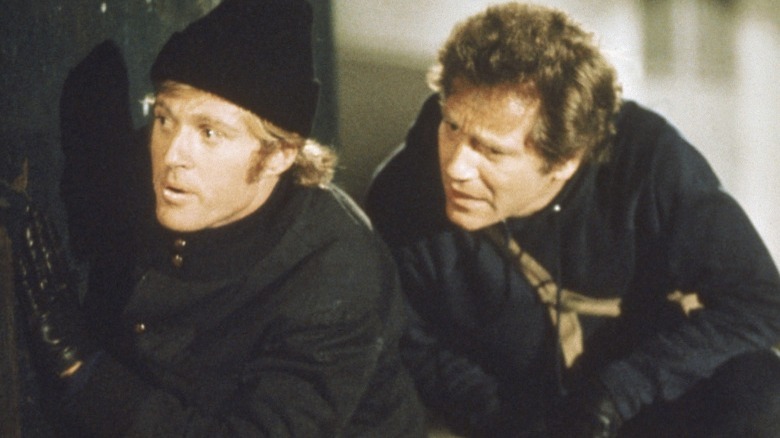
A lesser known entry, "The Hot Rock" is one of screenwriter William Goldman's wittiest and most playful screenplays, and one of the most outright funny heist movies of all time. Based on the Donald E. Westlake story, but much more lighthearted in tone than it's source material, "The Hot Rock" technically consists of four heists -- its hapless band of criminals attempts to steal the same diamond from a museum, a prison, a police station, and, finally, a bank. As their patron (Moses Gunn) says, "I've heard of the habitual criminal, but I never thought I'd be involved in the habitual crime."
Robert Redford, George Segal, Ron Liebman, and Paul Sand make a brilliantly funny team, constantly bickering and irritating each other. Segal is at his neurotic best as the lock picker, go-between, and grifter (the moment when he freaks out while picking a museum lock is hysterical). Liebman is a blast as the single-minded getaway driver, and Sand's ineffectual explosives expert is so well observed that it's a wonder that he didn't go on to greater things. Redford is the glue that holds the whole film together, though, largely playing it straight but allowing himself a moment of levity in the film's final moments, which is one of the most well-earned feel-good endings to a heist film ever. Shamefully underseen, "The Hot Rock" deserves way more exposure.
The Friends Of Eddie Coyle
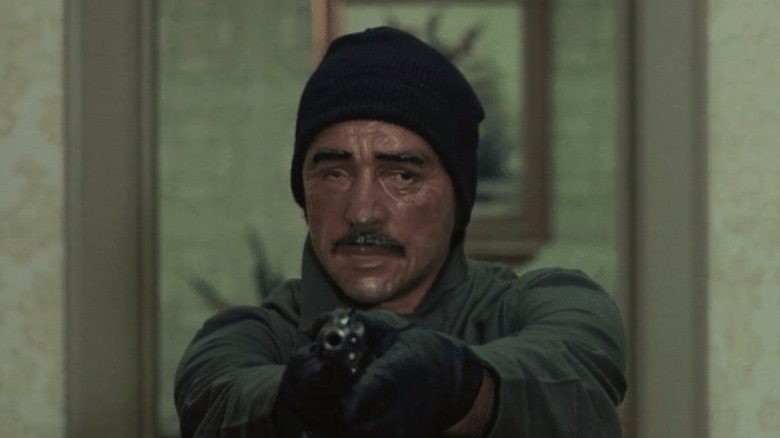
"The Friends Of Eddie Coyle" is our second Peter Yates film in a row, but tonally it's completely different from "The Hot Rock." While "The Hot Rock" is a fun, laidback romp, "The Friends Of Eddie Coyle" is one of the most pessimistic, bleak crime stories ever committed to film -- even the title is ironic.
An adaptation of a George V. Higgins novel, "The Friends of Eddie Coyle" follows the titular protagonist (Robert Mitchum) as he struggles to get out of jail by snitching on his fellow thieves after a series of bank robberies. Yates goes to great lengths to show how the grift never ends on either side of the law; we see informants and cops lie and cheat just as much as the thieves. "The Friends of Eddie Coyle" is memorable for the innovative, albeit ruthless, methods employed by the bank robbers -- rather than using any high tech gadgets or heavy duty firearms, they simply hold the bank manager's family hostage.
"The Friends of Eddie Coyle" cast a huge shadow over the crime cinema to come, especially modern classics like "The Town" and "Killing Them Softly," which lift plot elements from this movie wholesale. Yates might not be the most celebrated film director, but his two entries on this list demonstrate his versatility. This is his crowning achievement: an unapologetically downbeat, gritty neo-noir that gave Mitchum his last truly iconic role, and that features excellent supporting turns from Richard Jordan and Peter Boyle.
Reservoir Dogs
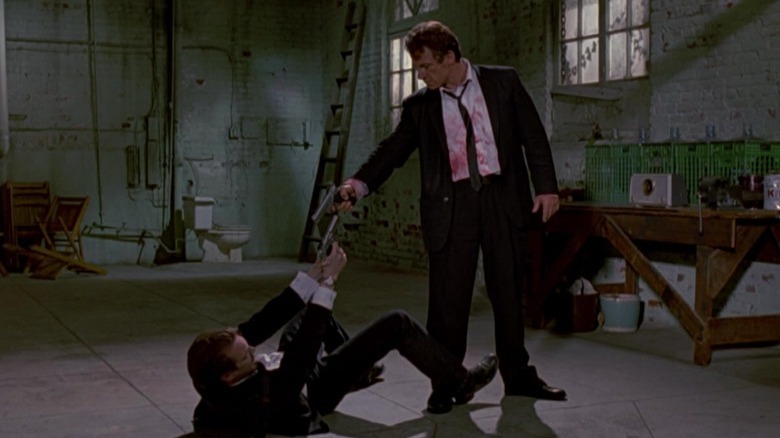
Despite having a reputation as one of the most iconic heist movies of all time, Quentin Tarantino's debut film doesn't even show you the heist itself, instead focusing on the gang's preparations and the chaotic aftermath. Whether he acknowledges it or not, Tarantino borrowed much of the story from Ringo Lam's "City On Fire," but there's little doubt that this is a superior film -- the dialogue crackles right from the pre-titles scene, and Tarantino conveys the chaos of the bank robbery without ever showing the characters stepping into the bank.
As with the best heist films, the cracks start to show after the robbery itself, and while the dialogue, pop culture references, and infamous torture scene are rightly celebrated, what often goes unmentioned is Tarantino's incredibly mature storytelling ability -- the non-linear narrative structure and his smart use of flashbacks reveal each of the robbers background, and informs their characters in the present without requiring too much exposition. Hugely influential, "Reservoir Dogs" is still Tarantino's leanest, most muscular film.
Criss Cross
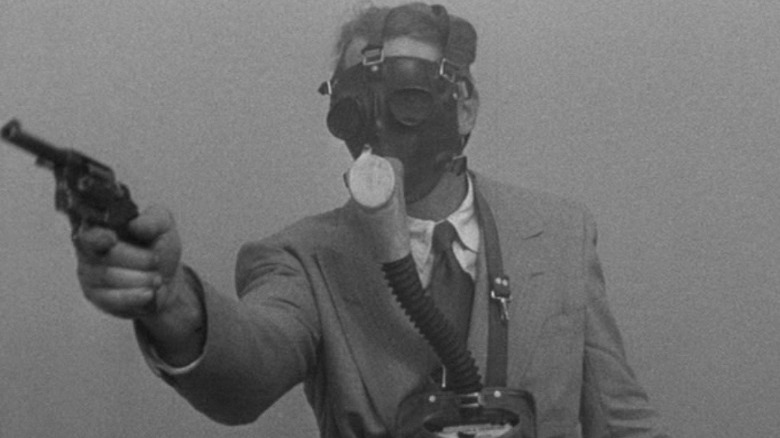
One of the most underrated film noirs of all time, Robert Siodmak's "Criss Cross" has Burt Lancaster as his usual, perpetually doomed self, playing the disillusioned hero who takes a job as a driver for an armored car company when his femme fatale ex Yvonne DeCarlo walks back into his life. The best thing about "Criss Cross" isn't the heist itself (even though the gas masks and smoke bombs make for some great visuals), but the story leading up to it -- the only reason that Lancaster even pitches the plan is to explain his presence in DeCarlo's home to her gangster husband Dan Duryea.
The robbery isn't just incidental, though, as we see a distinguished heist planner (Alan Napier) meticulously plotting the robbery down to the last detail. The most suspenseful scene in the film is the one immediately following the heist, as Lancaster is recovering in hospital and is visited by several people, one of whom may or may not be a hitman. "Criss Cross" is a fatalistic, often elegiac walk into the dark side; Lancaster has so many opportunities to go straight, but his descent back into his old ways is grimly inevitable. Dan Duryea is brilliantly slimy as the gang's ringleader, and DeCarlo makes for an oddly sympathetic femme fatale. The ending is both tragic and poetic -- it's pretty much the perfect film noir.
Le Cercle Rouge
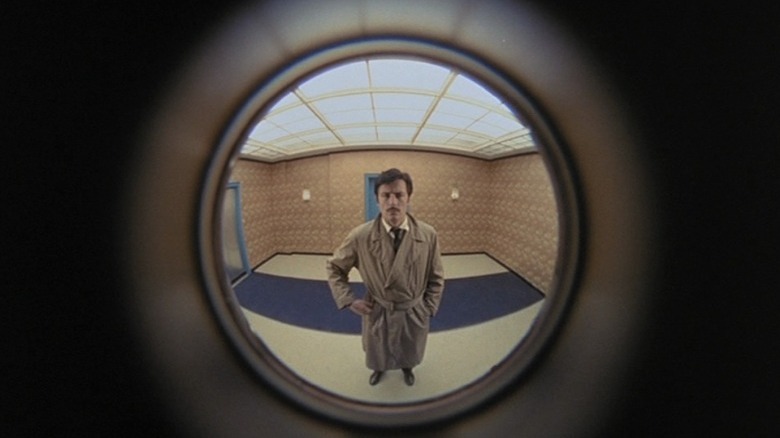
Jean Pierre Melville's slick style was uniquely suited for a heist film. He previously made "Bob Le Flambeur," another classic, but "Le Cercle Rouge" is more satisfying on every level. Melville missed out on his chance to direct the ultimate heist film when he was turned down for "Rififi", but got his second chance with this effortlessly cool and very French movie.
"Le Cercle Rouge" features the always fantastic Alain Delon as a newly released felon who immediately begins planning a jewel robbery, recruiting fugitive Gian Maria Volonte and alcoholic ex-cop Yves Montand to assist him, all the while being pursued by dogged detective Andre Bourvil. The 20-minute heist sequence is almost as great as that in "Rififi," again conducted in complete silence, and with Melville's typical flourish. And, as ever, while the heist itself goes down without a hitch, it's the pre-existing grudges that prove to be the gang's undoing. Honor among thieves and loyalty are big themes, but any preconceptions audiences might have about the mythic romantic criminal are thoroughly washed away after the abrupt and incredibly fatalistic ending.
The Ladykillers
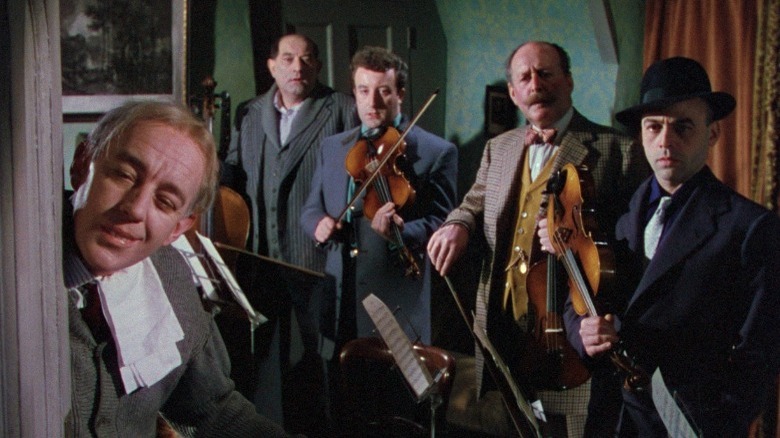
The interesting thing about heist movies is that the heist itself can just as easily serve as a catalyst for comedy. "The Ladykillers" is a perfect example. Alec Guinness' comically sinister professor plans a bank robbery in the house of the elderly Mrs. Wilberforce (Katie Johnson), and uses her as an unwitting courier for the money. The robbery goes off without a hitch, but when she discovers what's up, the gang has to get rid of her.
This premise could easily be a lot darker, but in the hands of Alexander Mackendrick it becomes a morbidly funny comic masterpiece, as the gang decide that it's infinitely preferable to bump each other off than to murder an elderly woman. The whole gang is brilliantly cast (Peter Sellers and Herbert Lom being the standouts), with each of their personality flaws evident from very early on. Lom's humorless gangster in particular harkens back to classic Hollywood heist films, as the professional hood "can't stand" little old ladies.
In fact, a huge amount of the film's success comes from characters playing it straight amidst the increasingly absurd situation they find themselves in. This applies to the central heist as well. "The Ladykillers" proves that you can build a great comedy around a well-planned heist -- the robbery itself is genuinely compelling and only falls apart because of the human element, just as in the films from the classic Hollywood era.
Rififi
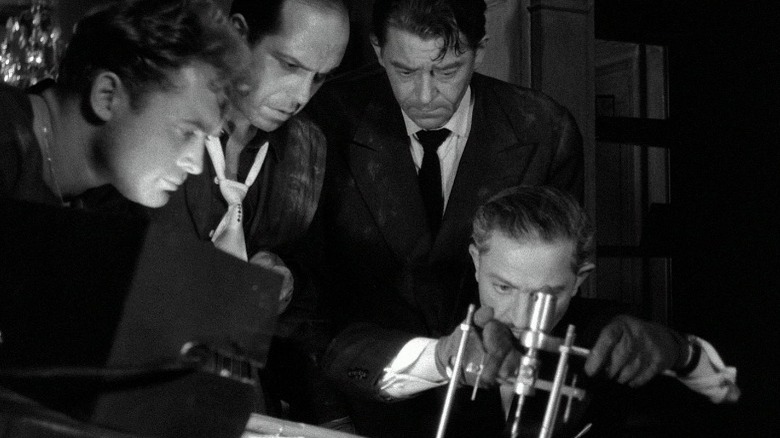
The quintessential heist film, the masterstroke of Jules Dassin's "Rififi" is that the robbery itself goes off without a hitch, only for problems to arise after the fact. The gang are all portrayed as seasoned professionals, and the heist is one of the most iconic sequences in cinema, shot in real time (taking about 30 minutes) and executed in complete silence -- there's no dialogue and no music. It's a supremely tense scene, and features an incredible attention to detail; the robbers wear ballet shoes to muffle the sound, and use an umbrella to catch the debris as they knock through the ceiling.
Dassin makes the four gang members likeable and charismatic, but imbues each one with a weakness that's exploited by the gangsters pursuing them. As the thieves' ringleader, Jean Servais has a wonderfully craggy face, mournful eyes, and a laconic delivery ideally suited for film noir, while Dassin himself plays the lovelorn safecracker who provides much of the film's pathos, and whose romantic tendencies land everyone in hot water.
The Asphalt Jungle
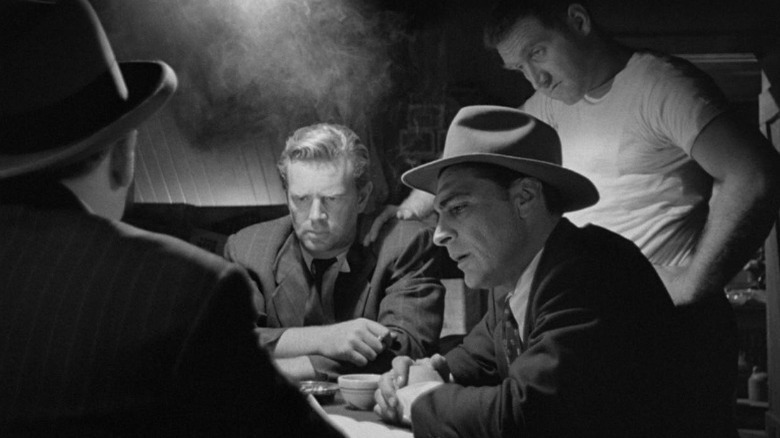
Once called the greatest film ever made by Jean Pierre Melville, there's no denying the impact John Huston's film noir made on cinema. It features all the archetypes associated with heist films, from Doc (Sam Jaffe) as the mastermind with a weakness for pretty girls to the Sterling Hayden's Dix, a heavy with hidden depths. Featuring the iconic line that describes crime as "just a left-handed form of human endeavor," "Asphalt Jungle" is the definitive heist film, and a clear influence on "Reservoir Dogs," among many others.
A formidable rogues gallery is played to perfection by a superb cast; there's the corrupt lawyer (Louis Calhern) who wants to bankroll the robbery despite having no money of his own, the pitiful bookie (Marc Lawrence), the genial hunchbacked getaway driver (James Whitmore), and slick safecracker Louis (Anthony Caruso), not to mention a young Marilyn Monroe in one of her first film roles.
The necessities of the Hays production code meant that the robbers had to either go to prison or get killed before the end of the film. However Huston takes pains to portray the law enforcement as either puritanical or corrupt, while the thieves themselves are all much more sympathetic; one of the "villains" doggedly searches for his family farm out of a childish sense of nostalgia, even as the net tightens around him. Pulpy, bitterly ironic, and heartbreaking in equal measure, "Asphalt Jungle" might just be the greatest heist film of all time.
Read this next: The Best '70s Crime Films You've Never Seen
The post The 20 best heist movies of all time appeared first on /Film.
from /Film https://ift.tt/2UZI4fA
via IFTTT
Comments
Post a Comment